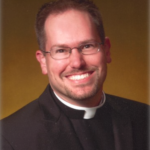08/19/2022
The Gifts – and Challenges – of Ecumenism and Interreligious Dialogue
 Rich Andre, CSP
Rich Andre, CSP
August 19, 2022
 Rich Andre, CSP
Rich Andre, CSP
August 19, 2022
Even before the founding of the Paulist Fathers in 1858, the first five future Paulists each had a deep commitment to dialogue with other Christian traditions. All five of them had become Catholics as adults. Unlike most other Catholic priests in the 1850s, they were committed to explaining the Catholic faith to their Protestant neighbors. They apparently did this for two reasons: (1) to help Protestant Americans better understand the beliefs of Catholics, and (2) to encourage Protestants to convert to Catholicism.
Today, consistent with the teachings of the Vatican’s Decree on Ecumenism, Unitatis Redintegratio (1964), most Paulists are uncomfortable using the term “conversion” to describe the process of a non-Catholic Christian coming into full communion with the Catholic Church. Every professed Christian – regardless of denomination – has experienced an initial conversion to the Christian faith, and the Holy Spirit continues to call each of us to a deepening conversion in following Christ. To me, using the word “conversion” to describe changing one’s religious denomination is offensive. It seems to imply that the Holy Spirit’s gifts are restricted to Catholics!
The Paulists were also prophets in interreligious dialogue, but that took longer to develop. While Paulist founder Isaac Hecker studied world religions during his spiritual seeking of the 1840s, it took until the mid-20th century for multiple Paulists to call for the Church to revisit its relationships with other world religions, especially in light of the Holocaust. Most notably, Paulist Father Tom Stransky was the main author of Nostra Aetate, the Declaration on the Relation of the Church to Non-Christian Religions (1965). Nostra Aetate upholds everything that is “true and holy” in other world religions, explicitly citing specific teachings in Hinduism, Buddhism, Islam, and especially Judaism. It goes on to “reprove, as foreign to the mind of Christ, any discrimination against [people] or harassment of them because of their race, color, condition of life, or religion.”
Every Christian is obligated to promote Christian unity and interreligious dialogue, and it can be hard to know where to begin. Three of the best ways are to learn about the beliefs of other people, establish deep relationships with them, and attend their worship services. The challenge is that it takes sustained effort. It’s true for us as individuals, as a community, as clergy, as lay staff, and as volunteers. No matter what we do, let’s keep in mind a paraphrase of Unitatis Redintegratio: “In essentials, unity; in non-essentials, diversity; in all things, charity.”
We are in the middle of a once-in-a-generation opportunity to celebrate something special among the three Abrahamic religions. In 2021 and 2022, Passover, Holy Week, and Ramadan all overlapped, but most of us were too distracted by the pandemic to pay much attention. They will do so again in 2023 and won’t again until 2055. I am contemplating what else I can do, what else we can do to deepen our bonds, our understanding, our deepening of relationship with our loving God